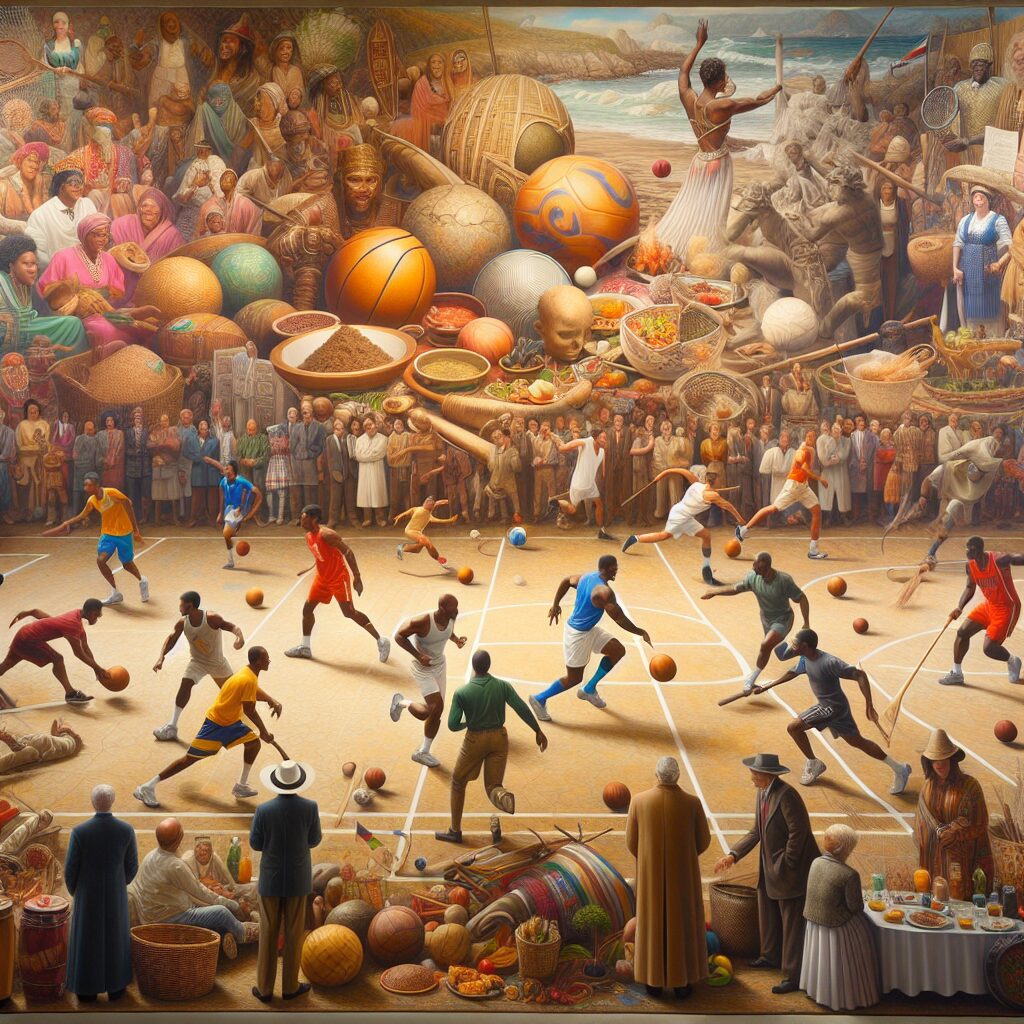Cultural identity and ball games: two seemingly unrelated concepts that are intertwined in the fabric of society. To understand this connection, let’s first delve into the idea of cultural identity. Cultural identity refers to the sense of belonging and self-identification that individuals develop through their shared values, customs, traditions, and beliefs. It is a reflection of the unique characteristics and experiences that shape a particular group or community.
Ball games, on the other hand, have been a part of human history for centuries. Whether it is soccer, basketball, cricket, or any other ball game, these sports have the power to unify people from different walks of life. Ball games act as a platform where individuals come together, united in their love for the game, and the thrill it brings. However, they are also a reflection of the society in which they are played.
In this article, we will explore the fascinating relationship between cultural identity and ball games. We will uncover how ball games serve as a mirror to society, highlighting the social, economic, and political factors that shape our cultural identities. From the impact of globalization on sports to the evolution of traditions within different communities, we will examine the key takeaways that shed light on the dynamic nature of cultural identity in the realm of ball games.
Key Takeaways
1. Ball games serve as a reflection of cultural identity and societal values, offering a deeper understanding of a community’s history, traditions, and social structures.
2. Through observing and analyzing ball games, researchers can gain insights into the power dynamics, class divisions, and gender roles prevalent within a society.
3. Ball games act as a cultural glue, uniting individuals across generations, fostering a sense of belonging, and preserving cultural heritage.
4. The evolution of ball games mirrors societal changes, demonstrating how cultural practices adapt and evolve as a result of globalization, colonization, or technological advancements.
5. The interpretation and perception of ball games can vary among different regions and communities, highlighting the diverse ways people assign meaning and significance to sports within their cultural context.
The Evolution of Ball Games
In order to understand how ball games reflect the cultural identity of a society, it is important to examine their evolution throughout history. Ball games have been played by various cultures for centuries, and their rules and purpose have evolved significantly over time. From ancient civilizations to modern societies, ball games have served as a reflection of the values, traditions, and social dynamics of the communities that played them.
Sport as a Symbol of Identity
Ball games have often been used as a symbol of identity for communities and nations. The way a society perceives and participates in ball games can reveal its cultural values, beliefs, and priorities. For example, some cultures emphasize teamwork and cooperation in their ball games, while others prioritize individual skills and competition. The choice of ball game, its rules, and the manner in which it is played can all provide insights into the cultural identity of a society.
Cultural Significance of Ball Games
Ball games hold significant cultural value in many societies. They often serve as a platform for showcasing cultural heritage, traditions, and artistic expressions. Traditional ball games, such as Native American lacrosse or Mexican Ulama, have deep roots in indigenous cultures and continue to be important cultural practices. By observing the rituals, costumes, and narratives associated with these games, one can gain a deeper understanding of the cultural identity of the communities where they originated.
Reflection of Gender Roles
Ball games can also reflect the gender roles and dynamics within a society. Historically, many ball games were exclusively played by men, while women had different forms of physical activities. The reasons behind such gender-specific participation were often rooted in social norms, power dynamics, and cultural expectations. By examining the role of gender in ball games, one can analyze the cultural identity and values related to gender roles in a particular society.
Ball Games and Social Equality
Understanding how ball games reflect society includes considering the issue of social equality. The accessibility and inclusivity of ball games can vary greatly across different societies. Some ball games have historically been restricted to specific social classes, ethnic groups, or genders, reinforcing divisions between them. Conversely, in societies where ball games are celebrated as inclusive and unifying activities, they can promote social cohesion and break down barriers.
Globalization and Adaptation
The impact of globalization on ball games and their reflection of cultural identity cannot be ignored. In many cases, ball games have been influenced by external cultures through colonization, migration, or international competitions. This has resulted in the adaptation and fusion of different cultural elements within the games. Examining how ball games have changed and integrated new influences offers valuable insights into how societies navigate cultural identity in an increasingly interconnected world.
Guides for Understanding Cultural Identity and Ball Games:
- How can studying the history of ball games illuminate cultural values and traditions?
- What can the rules and gameplay of a specific ball game tell us about a society’s cultural priorities?
- What are some examples of ball games that have significant cultural significance in various societies?
- How do gender roles and dynamics manifest in different ball games, and what can they reveal about a society’s cultural identity?
- What role does inclusivity and accessibility play in using ball games as a reflection of societal values?
- How has the globalization of ball games impacted their cultural identity and representation?
Frequently Asked Questions
1. What is the connection between ball games and cultural identity?
Ball games have a deep-rooted connection with cultural identity as they often reflect the values, traditions, and social dynamics of a society. The way these games are played, valued, and celebrated within a particular culture can reveal insights into its collective mindset and historical development.
2. How do ball games influence cultural identity?
Ball games have the power to influence cultural identity by serving as symbols of national pride, fostering a sense of unity among communities, and preserving traditional skills and techniques. These games often reflect the cultural and historical heritage of a society, contributing to the development and preservation of its unique identity.
3. Can ball games be used as a tool for cultural exchange?
Absolutely! Ball games provide a platform for cultural exchange as they bring together individuals from different backgrounds and allow them to connect through a shared love for the sport. Through international competitions or friendly matches, ball games offer an opportunity to appreciate and learn from diverse cultural perspectives.
4. How do ball games reflect social dynamics?
Ball games can reflect social dynamics by highlighting issues of equality, power, and social hierarchies within a society. The way different genders, ethnic groups, or social classes are represented and treated within the game can shed light on the prevailing social norms and challenges faced by these groups.
5. Are ball games a reflection of societal values?
Yes, ball games often mirror societal values by embodying principles such as teamwork, fair play, competition, and perseverance. The rules, sportsmanship, and behaviors exhibited during ball games can offer insights into the moral and ethical code upheld within a particular society.
6. How do ball games contribute to the preservation of cultural traditions?
Ball games contribute to the preservation of cultural traditions by keeping ancient forms of play or sporting techniques alive throughout generations. Traditional ball games are often passed down from one generation to another, serving as a means of cultural transmission and preserving customs that may otherwise fade away.
7. What role does globalization play in the evolution of ball games?
Globalization has had a significant impact on the evolution of ball games, bringing diverse cultural influences and introducing new techniques and formats. The exchange of ideas and practices across borders has led to the emergence of hybrid sports and has contributed to enriching the cultural tapestry of ball games worldwide.
8. How can ball games promote cultural diversity?
Ball games promote cultural diversity by allowing individuals from different backgrounds to come together, share their unique perspectives, and celebrate their distinctive cultural practices within a unified sporting environment. Through inclusivity and respect for diversity, ball games encourage a sense of acceptance and appreciation for different cultures.
9. Are ball games exclusive to certain cultures?
No, ball games are not exclusive to certain cultures. While some sports may have originated or gained popularity in specific regions, many ball games have transcended cultural boundaries and become global phenomena that are enjoyed by people of various backgrounds, irrespective of their cultural heritage.
10. Can ball games be used as a means of cultural diplomacy?
Definitely! Ball games can serve as a powerful means of cultural diplomacy by promoting mutual understanding, fostering friendly relations between nations, and acting as a bridge for diplomatic engagement. International tournaments and friendly matches often provide opportunities for cultural exchanges and diplomatic dialogue.
Final Thoughts: Cultural Identity and Ball Games
The interconnection between cultural identity and ball games runs deep. Through the lens of these sports, we glimpse the values, traditions, and societal dynamics that underpin a culture. Ball games not only reflect our cultural heritage but also act as catalysts for the preservation, exchange, and promotion of diverse cultures around the world.
By recognizing the significance of ball games in shaping cultural identity, we can foster inclusivity, respect, and appreciation for the countless ways in which societies express themselves through sport. Embracing the diversity within ball games empowers us to celebrate our shared humanity and strengthen the bonds that unite us as members of a global society.




